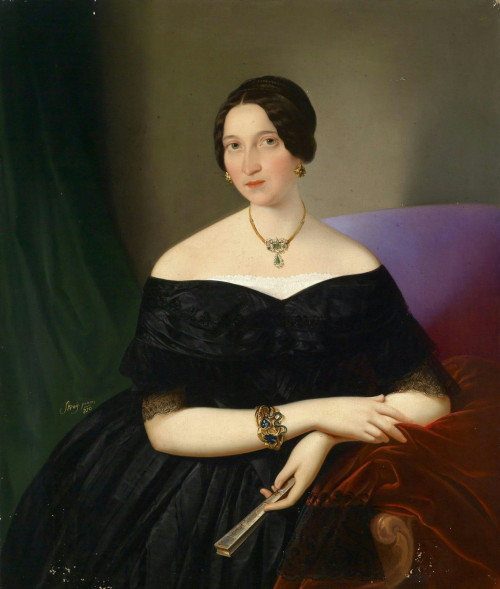France Prešeren and Slovenian Romantik
The German-Slovenian poet, writer, and playwright Luiza Pesjak (1828-1898) is inscribed in Slovenian cultural consciousness primarily as the daughter of France Prešeren's employer, the court advocate Blaž Crobath (1797-1848), and as Prešeren's student - he taught her languages, history, and world literature at the Crobaths' house in Ljubljana. And although in the environment of her multicultural bourgeois family and the literary salon she experienced as a student of Prešeren's, it was almost natural for everyone to try their hand at being a poet, it was her Poetic Attempts, written in German in 1843-44, that encouraged Prešeren to respond to the author with the sonnet To a Young Poetess. He encouraged her to follow her inspiration and follow in the footsteps of the ancient Greek poet Sappho. Luiza Pesjak, who slightly idealized Preseren in her memory - black suit, mild and friendly face, long black, somewhat curly hair, high forehead, light gray and warm looking eyes, had also not forgotten the poet and paid him due respect by making him the hero of a tragedy (1871).
Of course, the author not only humbly followed the admired poet, but her diverse literary work also shows her own formative participation in the programmatic development of realist narrative art in the Slovene language. Her work Beatin dnevnik (Beata's Diary) represents a special highlight, also in the overall picture of Slovenian literature. On the one hand, she introduced the foreign genre of the diary novel into Slovenian literature, and on the other hand, in it she tried to convey a real picture of the world and to channel her patriotic tendencies and aspirations in a higher and aesthetically solid form, also under the influence of the realist current. The middle part of the display case shows the "draft" of the novel in the form of a handwritten intimate diary of a sixteen-year-old aspiring literary woman, which forms the basis of the novel Beatin dnevnik, written in 1882 and published in 1887.
In 1865, Luiza Pesjak also published a German translation of Prešeren's poems in Ljubljana under the title Poesien von Dr. Franz Prešeren. From the early 1870s to the late 1880s, her poems, most of which are available in both German and Slovene, filled the pages of the first major journal for a Slovene "Kinderbiedermeier." In a cleaned-up form, these texts flowed into her collection of children's poems Ins Kinderherz, in which she - like France Prešeren quite a while before - attempted to lure Slovenian children and young people onto the right path through the beautiful word.
